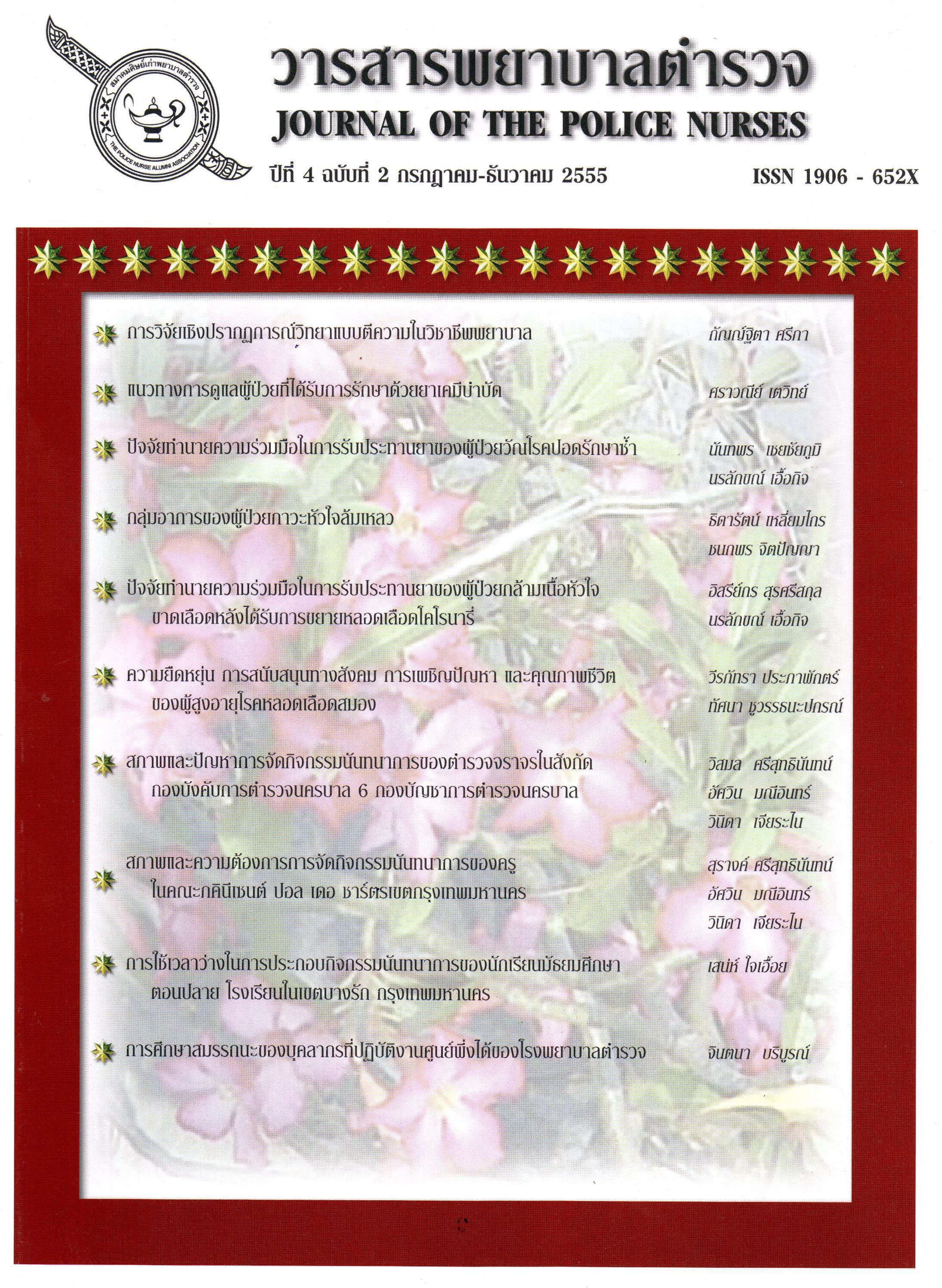ความยืดหยุ่น การสนับสนุนทางสังคม การเผชิญปัญหา และคุณภาพชีวิต ของผู้สูงอายุโรคหลอดเลือดสมอง
Keywords:
ความยืดหยุ่น, การสนับสนุนทางสังคม, การเผชิญปัญหา, คุณภาพชีวิต, ผู้สูงอายุโรคหลอดเลือดสมอง,Abstract
บทคัดย่อ
การวิจัยครั้งนี้มีวัตถุประสงค์เพื่อศึกษาความสัมพันธ์ระหว่าง ความยืดหยุ่น การสนับสนุนทางสังคม การเผชิญปัญหา และคุณภาพชีวิตของผู้สูงอายุโรคหลอดเลือดสมอง ตัวอย่างคือ ผู้สูงอายุโรคหลอดเลือดสมอง จำนวน 140 คน ได้จากการสุ่มอย่างง่าย จากผู้ป่วยที่มารับการรักษาแผนกผู้ป่วยนอก คลินิกอายุรกรรมประสาทโรงพยาบาลจุฬาลงกรณ์ สถาบันประสาทวิทยา และโรงพยาบาลตำรวจ เครื่องมือที่ใช้ ประกอบด้วย แบบสอบถามข้อมูลส่วนบุคคล แบบวัดความยืดหยุ่น แบบวัดการสนับสนุนทางสังคม แบบวัดการเผชิญปัญหา และแบบสอบถามคุณภาพชีวิต (SF-12 version 2) ซึ่งผ่านการตรวจสอบความตรงตามเนื้อหา และทดสอบหาค่าความเที่ยงได้ค่าสัมประสิทธิ์แอลฟาครอนบาคเท่ากับ .84, .88, .75 และ .87 ตามลำดับ วิเคราะห์ข้อมูลโดยใช้ค่าสัมประสิทธิ์สหสัมพันธ์ของเพียร์สัน
ผลการวิจัยพบว่า ผู้สูงอายุโรคหลอดเลือดสมองมีคุณภาพชีวิตด้านสุขภาพกายในระดับต่ำ ( = 43.37) แต่มีคุณภาพชีวิตด้านสุขภาพจิตอยู่ในระดับปานกลาง (
= 53.18) โดยความยืดหยุ่นมีความสัมพันธ์ทางบวกกับคุณภาพชีวิตด้านสุขภาพกายและด้านสุขภาพจิตอย่างมีนัยสำคัญทางสถิติที่ระดับ .01 (r = .279, r = .297 ตามลำดับ) สำหรับการสนับสนุนทางสังคมไม่มีความสัมพันธ์กับคุณภาพชีวิตทั้งด้านสุขภาพกายและด้านสุขภาพจิต ส่วนการเผชิญปัญหาด้านการเผชิญหน้ากับปัญหามีความสัมพันธ์ทางบวกกับคุณภาพชีวิตทั้งด้านสุขภาพกายและสุขภาพจิตอย่างมีนัยสำคัญทางสถิติที่ระดับ .05 และ .01 (r = .197 และ r = .286 ตามลำดับ) ด้านการจัดการอารมณ์มีความสัมพันธ์ทางลบกับคุณภาพชีวิตทั้งด้านสุขภาพกายและสุขภาพจิตอย่างมีนัยสำคัญทางสถิติที่ระดับ.01 (r = -.260 และ -.451 ตามลำดับ) ด้านการเผชิญปัญหาแบบเบี่ยงเบนความรู้สึกไม่มีความสัมพันธ์กับคุณภาพชีวิตด้านสุขภาพกาย แต่มีความสัมพันธ์ทางบวกกับคุณภาพชีวิตด้านสุขภาพจิตอย่างมีนัยสำคัญทางสถิติที่ระดับ .05 (r = .210)
Resilience, Social Support, Coping and Quality of Life of Older Persons with Stroke
Abstract
The purpose of this study was to examine the relationships between resilience, social support, coping and quality of life of older persons with stroke. Simple random of 140 older persons with stroke were selected from patients who receiving treatment at neurological medicine clinic, out-patient department of King Chulalongkorn Memorial Hospital, Prasat Neurological Institute and Police General Hospital. The instruments were demographic questionnaire, Resilience Scale, Social Support Questionnaire, Jalowiec Coping Scale and Quality of Life Scale (SF-12 version 2). All instruments were tested for content validity. Cronbach’s alpha coefficients of reliability were .84, .85, .75 and .87 respectively. Data were analyzed by using descriptive statistics and Pearson’s product moment correlation. The results were as follows:
- Quality of life in physical component of older persons with stroke was low (
= 43.37) while quality of life in mental component of older persons with stroke was moderate (
= 53.18).
- Resilience was significantly positive correlated with both of quality of life in physical and mental components in older persons with stroke (r = .279, r = .297, p < .01).
- Social support was not correlated with both of quality of life in physical and mental components in older persons with stroke.
- Confrontive coping was significantly positive correlated with both of quality of life in physical and mental components in older persons with stroke (r = .197, r = .286). Emotive coping was significantly negative correlated with both of quality of life in physical and mental components in older persons with stroke (r = -.260, r = -.451, p < .01).Palliative coping was not correlated with quality of life in physical component but significantly positive correlated with quality of life in mental component in older persons with stroke (r = .210, p < .05).
Downloads
Downloads
How to Cite
Issue
Section
License
ผลงานที่ได้ตีพิมพ์แล้วจะเป็นลิขสิทธิ์ของวารสารพยาบาลตำรวจ















